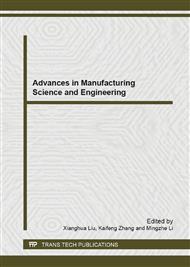p.82
p.87
p.94
p.98
p.105
p.111
p.115
p.119
p.124
Preparation and Tribological Performace of Microcapsules of Butyl Stearate and Melamine-Formaldehyde Resin
Abstract:
With butyl stearate (BS) as the core material and melamine-formaldehyde resin (MF) as the wall material, BS-MF resin microcapsules were synthesized under in situ polymerization method. The microcapsules were characterized using FTIR, SEM and other methods. The four-ball friction method was performed to test the tribological property of the microcapsules when polyethylene glycol was taken as the base fluid. The results showed that base fluid with 3% microcapsules had a friction coefficient as small as 0.053 and the wear scar diameter could be 0.326mm (4%) under 314N. The microcapsules were ruptured under the action of friction and then the reactive group formed physical adsorption film. The physical adsorption film, together with the subsequently formed friction polyester film, presented a synergistic lubricating effect.
Info:
Periodical:
Pages:
105-110
Citation:
Online since:
June 2013
Authors:
Keywords:
Price:
Сopyright:
© 2013 Trans Tech Publications Ltd. All Rights Reserved
Share:
Citation:


